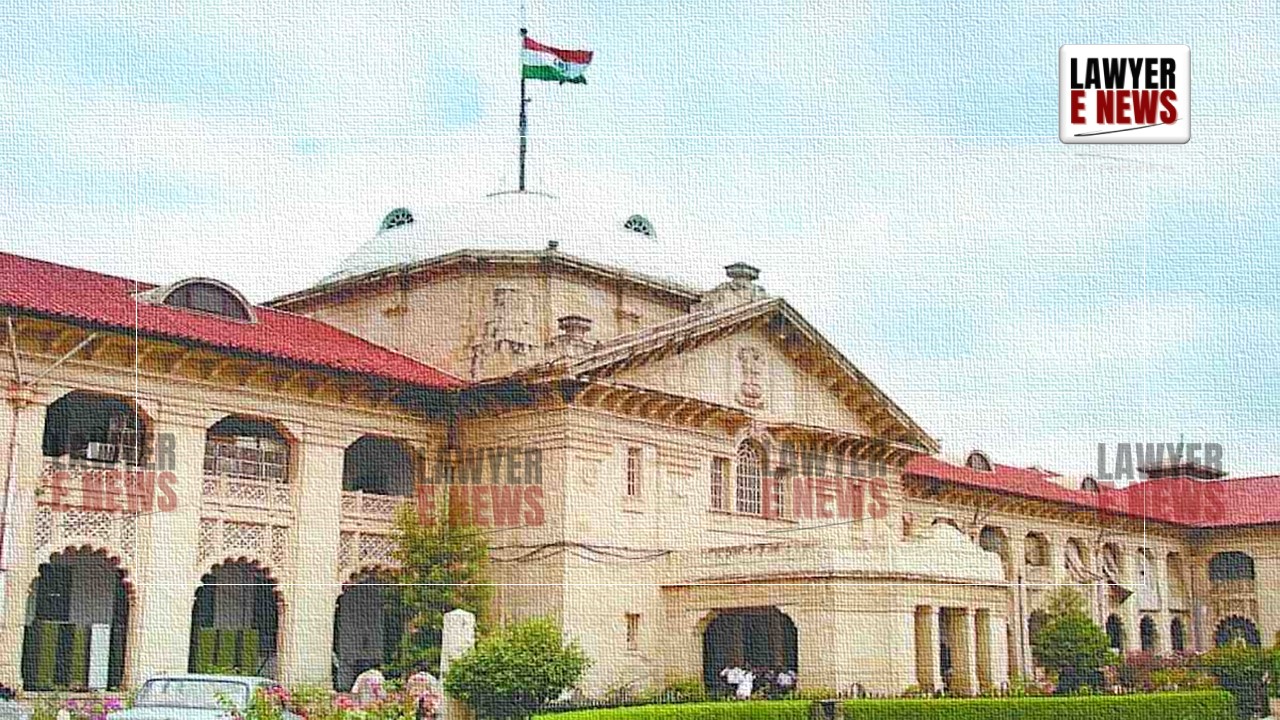-
by Admin
15 February 2026 2:36 AM



"Limitation is a Mixed Question of Fact and Law Requiring Evidence" – Allahabad HC Clarifies. On November 18, 2024, the Allahabad High Court dismissed an appeal and upholding the first appellate court's decision to remand the matter to the trial court for reconsideration of limitation and other issues. The High Court emphasized that the issue of limitation in a suit seeking to declare gift deeds as void is not a pure question of law and must be decided after considering evidence.
The court concluded, “The question of limitation, intertwined with facts, cannot justify rejection of a plaint under Order VII Rule 11 CPC at its threshold.”
The dispute arose from Original Suit No. 83 of 2022 filed by the plaintiff-respondents, seeking to declare two registered gift deeds, dated May 25, 1968, and October 17, 1987, as null and void. The plaintiff contended that knowledge of the gift deeds was first acquired through a municipal notice issued on December 29, 2021. The defendant-appellant, however, filed an application under Order VII Rule 11 of the Code of Civil Procedure (CPC), 1908, arguing that the suit was barred by limitation under Article 58 of the Limitation Act, 1963.
The trial court accepted the defendant’s plea and rejected the plaint on November 22, 2022, holding the suit time-barred. On appeal, the first appellate court reversed the trial court's decision, directing the trial court to re-register the suit and frame the limitation issue as a mixed question of fact and law to be decided after leading evidence.
Aggrieved, the defendant-appellant approached the High Court, challenging the remand order and reiterating that the suit was barred by limitation.
The appeal before the Allahabad High Court raised the following legal questions:
Whether the trial court was justified in rejecting the plaint under Order VII Rule 11 CPC as time-barred.
Whether the plaintiff complied with Order VI Rule 4 CPC by adequately pleading particulars of fraud and misrepresentation.
Whether limitation in the context of Article 58 and Section 17(1)(b) of the Limitation Act could be decided without evidence.
The defendant argued that the plaintiff failed to disclose the date of knowledge of the fraud in the plaint, rendering it defective under Order VI Rule 4 CPC. Additionally, the appellant relied on precedents to claim that limitation could be decided as a pure legal issue at the preliminary stage.
The plaintiff countered that the municipal notice of December 29, 2021, revealed the existence of the disputed gift deeds for the first time. It was asserted that the question of limitation was intertwined with facts and could not be resolved without evidence.
The High Court held that limitation in this case could not be decided as a pure question of law at the preliminary stage, given the factual assertions regarding the plaintiff’s knowledge of the gift deeds. Referring to Section 17(1)(b) of the Limitation Act, the court noted that when fraud or concealment is alleged, the date of knowledge becomes critical and requires evidentiary scrutiny.
The court observed, “At this stage, when the evidence is yet to be led on all the disputed questions of fact and law, the question of limitation cannot be said to be a pure question of law so as to justify rejection of the plaint at its threshold.”
The defendant argued that the plaintiff failed to provide particulars of fraud or misrepresentation as required under Order VI Rule 4 CPC. The High Court, however, rejected this argument, holding that the omission to explicitly state the date of knowledge in the plaint was not fatal. It emphasized that the municipal notice of December 29, 2021, was already on record and formed part of the plaintiff’s case.
The court clarified, “Even if the date of receipt of the municipal notice was not explicitly mentioned in the plaint, the omission does not invalidate the suit when supporting documents are on record. The plaintiff retains the right to seek an amendment under Order VI Rule 17 CPC.”
The court reiterated that a plaint must be read as a whole, including accompanying documents, to determine whether it discloses a cause of action. It relied on precedents like Smt. Razia Begum v. Delhi Development Authority & Ors. and held that the municipal notice sufficiently supported the plaintiff's contention of acquiring knowledge in 2021. Thus, the plaint could not be rejected summarily under Order VII Rule 11 CPC.
The High Court clarified that neither the trial court’s nor the appellate court’s observations on limitation would bind the final decision of the trial court. It affirmed that the remand order was appropriate to ensure a comprehensive determination of all issues after evidence.
The High Court upheld the first appellate court’s remand order, directing the trial court to decide the limitation issue as a mixed question of fact and law after framing additional issues and inviting evidence. The appeal was dismissed, with the court reiterating that rejecting the plaint at this stage was unwarranted.
Limitation involving fraud or concealment under Section 17 of the Limitation Act requires evidentiary scrutiny.
Failure to explicitly mention particulars in the plaint under Order VI Rule 4 CPC does not automatically invalidate the plaint if supporting documents are on record.
A plaint must be read as a whole, including accompanying documents, before invoking Order VII Rule 11 CPC.
Date of Decision: November 18, 2024
